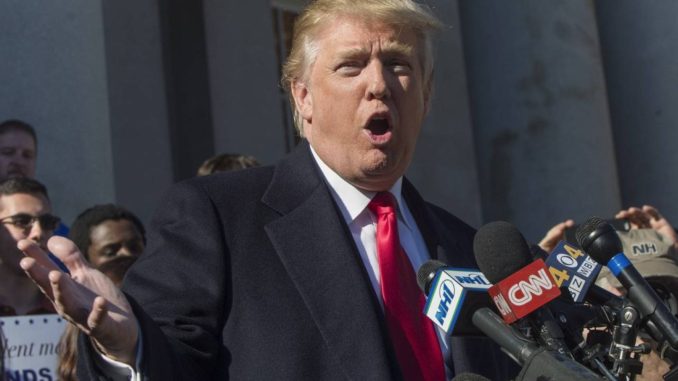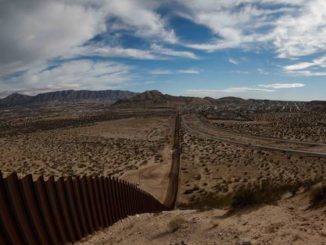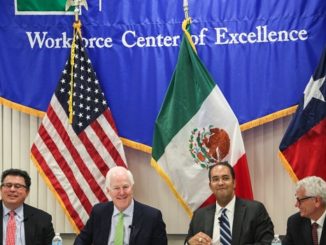
Levying tariffs on Mexico to pay for a border wall would launch a trade war.
U.S. manufacturing grew in October at its slowest pace in more than two years, according to Institute for Supply Management data released last week. Analysts put the blame on a feeble global economy and a strong dollar.
Without the North American Free Trade Agreement (Nafta), manufacturing would be in even worse shape. But don’t tell Donald Trump that. If elected president, he promises to “make America great again” by, among other things, blowing up the 1994 trade pact.
Mr. Trump’s campaign speeches have provided few details about how he intends to govern. But one specific pledge he has made repeatedly is to build a “beautiful” wall across the Mexican border and force Mexico to pay for it.
Mexico is not about to voluntarily foot the bill for any such wall. But Mr. Trump says that he can make our neighbor pay by imposing new tariffs on its exports to the U.S. In other words, Mr. Trump plans to launch a trade war with Mexico.
This is as preposterous an idea as it is dangerous. Let’s start with the painfully obvious: A tariff is not paid by the exporter but by the importer, who passes it on to the consumer. So the money for Mr. Trump’s wall will come out of the pockets of working Americans.
Mr. Trump may think that the new tariffs will make Mexican products too expensive for U.S. consumers, and when they don’t buy, he will have accomplished his goal of making Mexico “pay,” even though there will be no new revenue. But harm will also be done to American businesses, which will become less competitive without access to Mexican production. And if Mexico—which is the U.S.’s third-largest trading partner—responds with new tariffs of its own, U.S. exporters will also suffer.
It’s hard to see how any of this could be good for Americans. According to “NAFTA Triumphant,” a report last month by the U.S. Chamber of Commerce, annual U.S. trade with Canada and Mexico is now $1.3 trillion, nearly four times greater than before the agreement. Agricultural exports to Canada and Mexico have gone up by 350%, and U.S. service exports have tripled. More than a third of U.S. merchandise exports are now bought by Nafta partners.
A trade war would hurt American manufacturing because it would fracture the highly integrated North American economy. All three Nafta partners are competitive globally because they are able to allocate capital to its highest use anywhere on the continent. Mexico is the more labor intensive of the three Nafta countries, so it tends to import components, brands, technology and distribution systems from the U.S., and adds value by providing the labor necessary for assembly.
This has created a complex web of supply chains in a wide number of industries including aerospace, autos, electronics, machinery and precision instruments. These chains crisscross North America as firms seek to exploit comparative advantages. A September 2010 National Bureau of Economic Research working paper found that 40% of the content of U.S. imports from Mexico is produced by U.S. workers.
“In the highly integrated auto sector,” the Chamber of Commerce report notes, “it is common for cars assembled in the Great Lakes region to cross the U.S.-Canada border half a dozen times as they are assembled.” The result has been a more competitive U.S. auto industry, as evidenced by an 89% increase in exports between 2009 and 2014, “topping two million cars and trucks for the first time in 2014.”
U.S. companies using Canadian and Mexican inputs and labor also benefit from the relative weakness of the peso and the Canadian dollar. The total cost of a U.S. export that contains value added from a Nafta partner is lower, in the short run, than it would be if it were made completely in the U.S. Eventually prices adjust, but in the meantime manufacturing in a mix of currencies mitigates the effect of the strong dollar on U.S. exports. The continent’s access to low-price, reliable energy is adding to the might of the North American powerhouse.
Mr. Trump’s plan also fails from a security perspective. Mexican states that are engaged economically with their northern neighbors are growing faster than the rest of the country. They are also creating good jobs and raising living standards, necessary factors to stem the flow of Mexican migrants north.
U.S. businesses might be able to tap supply chains from Asia, albeit at a higher cost. But it can hardly be in the interests of Americans to isolate their southern neighbor and retard its economic progress.
Mr. Trump’s trade agenda is absurd and would invite a depression. He’s either too uneducated in economics to know that or too cynical to care.



